
Canal lining is a fundamental aspect of water management systems, particularly in irrigation, drainage and flood control projects. It enhances the functionality of open canals by reducing water loss, preventing erosion and ensuring smoother hydraulic flow. One of the most efficient methods of canal lining involves the use of precast concrete pipes. The production of these pipes is made possible by specialized concrete pipe machinery, which enables consistent manufacturing of large volumes of structurally reliable components.
The effectiveness of canal lining systems depends significantly on the quality and uniformity of the concrete pipes used. Whether the project involves small irrigation channels or major water transport canals, utilizing the right concrete pipe solutions contributes to long-term system performance. This article explains the critical role of concrete pipe manufacturing equipment in canal lining applications, emphasizing how it enhances construction speed, accuracy and reliability.

Concrete Pipes as Structural Components in Canal Lining
Concrete pipes are often deployed in canal lining to control seepage and support water conveyance through lined or covered systems. In projects where, open canals are susceptible to water loss due to infiltration, precast pipes offer a practical solution by encapsulating the water flow in enclosed, continuous structures.
Concrete pipes used in canal lining must fulfill several key criteria:
- Precision in internal and external diameter for uniform flow.
- High load-bearing capacity for soil and hydraulic pressure.
- Watertight joints to eliminate seepage losses.
- Smooth internal finish for reduced hydraulic friction.
These requirements necessitate the use of reliable machinery to ensure every pipe meets the design specifications of the canal system. The uniformity and structural integrity achieved through mechanical production directly support the operational goals of canal lining projects.
Concrete Pipe Machinery in Canal Lining Applications
Concrete pipe machinery is built to automate the creation of cylindrical concrete units that form part of a canal lining system. These machines are integral to delivering a high volume of pipes within the timeframe and quality standards required by large-scale infrastructure projects.
In canal lining, these machines contribute to:
- Speedy production of pipes tailored to canal cross-sections.
- Repetition of exact shapes and sizes for long canal runs.
- Adaptability to project-specific diameters and lengths.
- Production efficiency to meet project deadlines.
Machines ensure this consistency with minimal deviation. Their ability to deliver accurate, reinforced concrete units means the pipes can be installed back-to-back with proper alignment and joint sealing, minimizing disruption during flow operations.
Relevance of Concrete Pipe Moulds in Canal Projects
The use of concrete pipe moulds is critical in defining the geometric accuracy of each pipe segment. In canal lining, where alignment and flow uniformity are central, moulds must support the shaping of pipes that fit together seamlessly over long distances.
Concrete pipe moulds used in canal pipe production must:
- Accommodate specified pipe profiles for different flow capacities.
- Enable joint design that prevents leakage under hydraulic pressure.
- Maintain dimensional consistency through multiple casting cycles.
High-quality moulds ensure that every pipe conforms to project blueprints, allowing installation teams to maintain consistent gradients and flow paths along the length of the canal.
Installation Efficiency Supported by Machine-Made Pipes
Installation of concrete pipes in canal lining projects relies on the precise alignment and joint integrity of each segment. Poorly manufactured pipes can delay installation or cause long-term failures due to misalignment or joint leakage.
Machine-made pipes offer benefits such as:
- Exact dimensions that streamline trench preparation and pipe setting.
- Uniform weight and shape, aiding mechanical lifting and placement.
- Smooth joint interfaces for rapid sealing and connection.
These characteristics simplify the work of installation teams, reduce the margin for error and enhance the speed.
Minimizing Seepage with High-Precision Concrete Pipe Systems
Water loss through seepage is one of the primary issues that canal lining aims to mitigate. When pipes are accurately formed and installed, they provide an impermeable barrier that prevents groundwater infiltration and supports efficient water conveyance.
With the use of advanced concrete pipe machinery, the following are achieved:
- Improved joint sealing from consistent end geometry.
- Higher density concrete with better compaction.
- Minimal variation in pipe diameter and surface quality.
As a result, the system experiences fewer leaks and water delivery remains reliable over time. This directly supports agricultural and municipal water usage where efficiency and conservation are priorities.
Cost and Investment Considerations in Pipe Production
Although concrete pipe making machine price may vary depending on configuration, the cost-efficiency achieved over the life of a canal project often justifies the investment. High-performance machinery reduces labor needs, accelerates production schedules and ensures fewer product defects-all of which contribute to a lower per-unit cost.
To achieve the best price concrete pipe machine setup for canal lining purposes, project planners may focus on:
- Long-term productivity rather than just upfront equipment costs.
- Equipment durability in high-output production environments.
- Operational efficiency to reduce batch rejections and material waste.
A well-optimized machine line can meet both the budgetary constraints and performance expectations of canal lining stakeholders.
FAQs About Concrete Pipe Machines
Concrete pipe machinery produces uniform and structurally sound pipes that form the backbone of canal lining systems. The machinery enables high-volume, consistent production suited to long canal runs.
They offer accurate dimensions, reliable strength and quick installation. This leads to reduced seepage, efficient water flow and minimized construction delays.
Moulds shape the pipes to exact specifications required for proper canal alignment and joint sealing. They are essential for maintaining consistency throughout the length of the canal.
Yes. Modern machinery can be adjusted to produce pipes of various sizes and joint profiles, allowing flexibility for different canal dimensions and flow requirements.
Conclusion
Concrete pipe machines are central to the successful execution of modern canal lining projects. From precision in production to efficiency in installation, these machines enable manufacturers to meet the stringent demands of water infrastructure. With consistent output, superior build quality and the flexibility to adapt to changing project scopes, they ensure that canal systems are built to perform reliably for years.
By leveraging accurate concrete pipe manufacturing processes and incorporating optimized concrete pipe moulds, canal construction teams can achieve seamless alignment, water-tight systems and dependable long-term performance.
Recent Articles
- Precast Concrete Box Culvert for Urban Underpasses and Cable Trenches
- How Concrete Pipe Machines Crucial in Power Plant Infrastructure?
- Role of Concrete Pipe Machines in Canal Lining Projects
- How Drycast Technology is Changing the Concrete Pipe Industry?
- Common Mistakes to Avoid When Selecting Pipe Moulds for Your Machine





 BACK TO ARTICLES
BACK TO ARTICLES